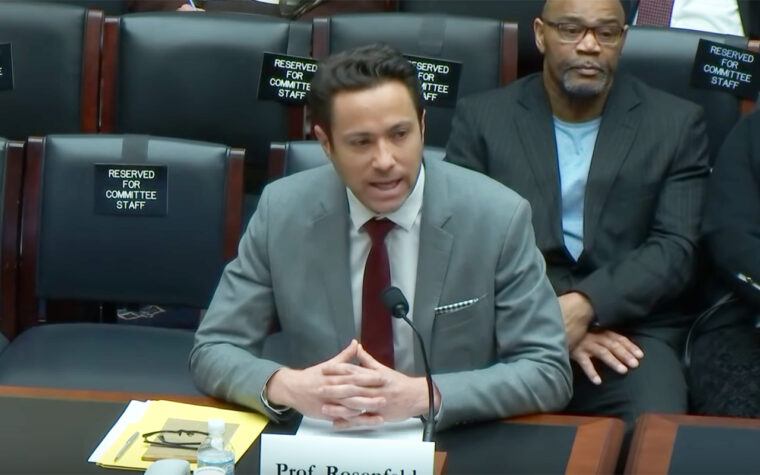New legislation designed to reverse a decades-long decline in worker’s rights under the National Labor Relations Act could play a critical role in reducing the growing income gap between rich and poor in America, according to the recent congressional testimony of a sociologist from Washington University in St. Louis.
“The unionization rate today is at its lowest point in over a century,” Jake Rosenfeld, associate professor of sociology in Arts & Sciences, said during his opening remarks at a March 26 hearing of the House Subcommittee on Health, Education, Labor, and Pension.
“It is as low as it was prior to passage of the National Labor Relations Act, a law intended to guarantee workers the right to bargain collectively with their employers,” he said. “This dramatic decline has far-reaching implications for our workforce.”
Rosenfeld is the author of “What Unions No Longer Do” (Harvard University Press, 2014) which details the consequences of labor’s decline: curtailed advocacy for better working conditions, weakened support for immigrants’ economic assimilation and ineffectiveness in addressing wage stagnation among African-Americans.
He was one of several labor experts called to testify as part of a congressional hearing on “Protecting Workers’ Right to Organize: The Need for Labor Law Reform.” The hearing opens the debate over a wave of pro-labor legislation expected to be pushed by Democrats in coming months, including, the Workplace Democracy Act and the Workers’ Freedom to Negotiate Act.
The March 26 hearing of the House Subcommittee on Health, Education, Labor, and Pension. Rosenfeld’s testimony starts at 19:45.
Based on research and other studies, Rosenfeld offered the subcommittee four key reasons why strengthening worker protection laws is critical for the well-being of all Americans:
- The decline of unions explains much of the rise in income inequality. Research finds that strong unions were a key factor in delivering widespread gains to millions of working- and middle-class Americans during the post-World War II decades. A 2011 study co-authored by Rosenfeld and Bruce Western of Columbia University finds that the fall in union membership explains a one-third rise in wage inequality among men, and about one-fifth among women.
- New studies reveal just how important unions were to non-union workers. Rosenfeld’s 2016 study co-authored with Patrick Denice, a Washington University postdoctoral fellow now at Western University, and Jennifer Laird, now at City University of New York, examined more than three decades of data on millions of non-union workers and found that weekly wages for non-union men would be over $50 higher if unions today remained as strong as they were in the late 1970s. For a year-round worker, this translates to an annual wage loss of $2,700.
- Strong unions support the economic standing of minorities, women and immigrants. The growth in union membership among African-American men and women in the 1970s and early 1980s helped put a serious dent in racial and gender wage gaps in the United States. Later, as union strength declined, these wage gaps widened. Rosenfeld’s 2013 research with Meredith Kleykamp of the University of Maryland indicates that had union membership rates for women remained at late-1970s levels, racial wage inequality among women in private sector jobs today would be reduced by as much as 30%. Other Rosenfeld research suggests that recent immigrants are joining industrial unions at high rates, but America’s shrinking manufacturing base is making these jobs much harder to find.
- It’s time to dispel the myth that U.S. workers have turned away from unions. If the private sector unionization rate were simply a function of worker’s desire, it would be much closer to 50% than its current rate of 5%, said Rosenfeld. In a 2017 study of 4,000 U.S. workers, nearly half of the non-union workers surveyed said they would join a union if given the chance. A recent Gallup poll found that support for labor unions is at a 15-year high, with nearly two-thirds of Americans expressing approval.
“This is what makes strengthening the National Labor Relations Act so important,’ said Rosenfeld as he concluded his prepared testimony. “Today, workers are often blocked from exercising their legally-guaranteed freedom to negotiate. Inequality has reached heights unscaled since the first Gilded Age.”


